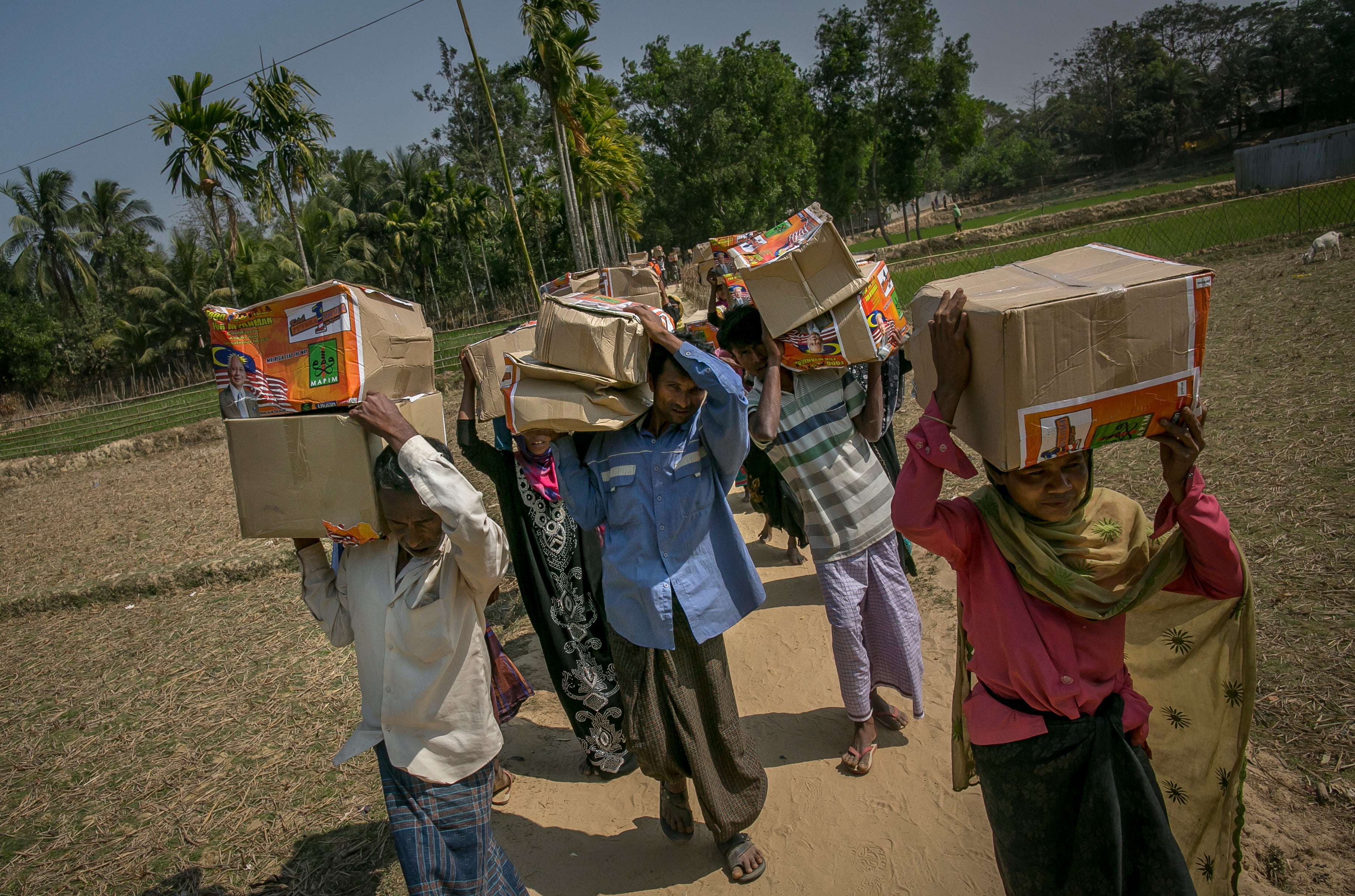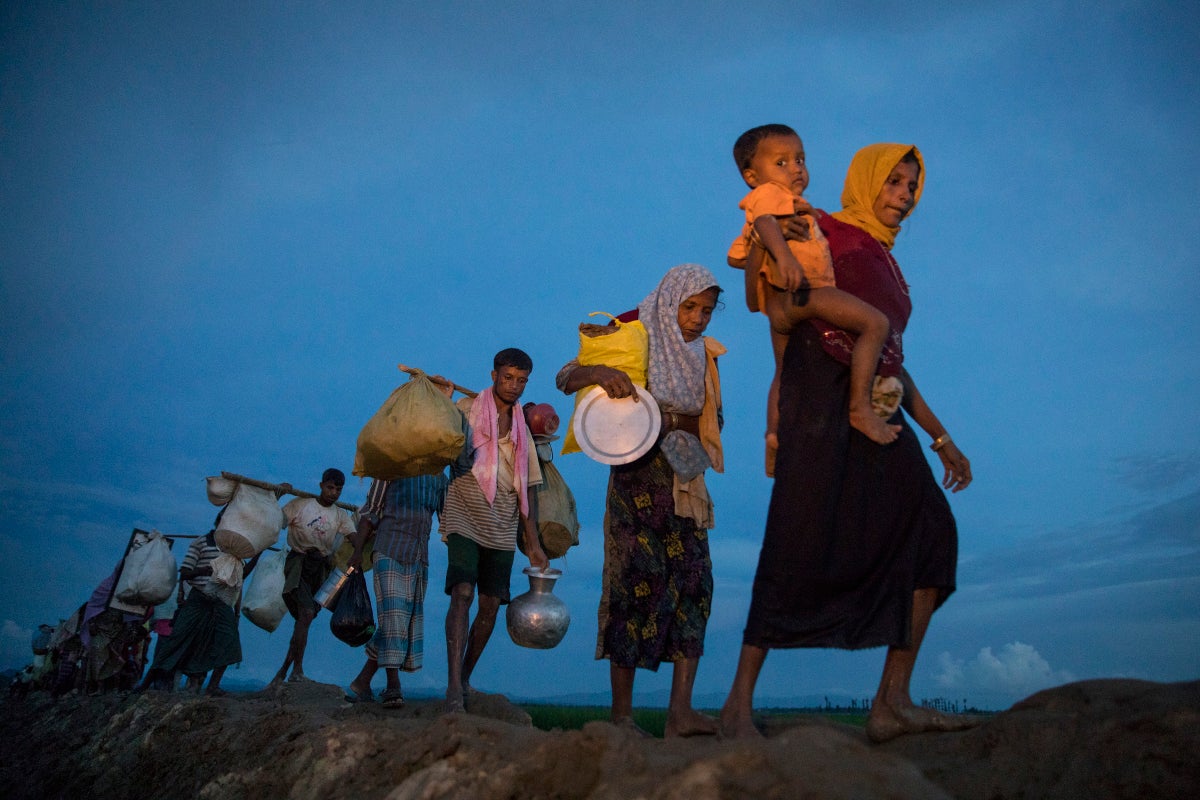For 13-year-old Mohammed Rias, it was the day of exams, a day to put all that he had learned to the test.
But instead of settling down in a classroom, he found himself fleeing his home, dodging a hail of bullets to escape forced conscription into a war which has persecuted his community for years.
Mohammed is a Rohingya who, until recently, was living in the Buthidaung township in Rakhine State, western Myanmar. For years, his community has been targeted by the junta who overthrew and imprisoned the democratic leader Aung San Suu Kyi in 2021.
Now the military – and the rebels they are fighting who want independence – are preying on the Rohingya again by forcing them to fight as foot soldiers.
Recalling unspeakable horrors that no teenager should have to live through, Mohammed describes how his family of seven made a run for their lives in December 2024.
“It started with the military junta dragging out young men from their homes for forcible conscription into the army to fight rebels,” he tells The Independent. “Everything was calm before that. But the recruitment drive flamed the fighting in the village.”

Mohammed describes how military leaders in Myanmar would identify young, tall, and fit men and forcibly enlist them, which enraged the rebel Arakan Army. In retaliation, the rebels launched attacks on villages, sometimes using drone strikes that killed hundreds.
“The day I left, I was supposed to take my exams. As we fled, the rebels began firing bullets and launching drones. Many were swept away by the river, and we had to walk over dead bodies to escape.
“We are being slaughtered. They [military and Arakan Army] hate us,” he says.
Mohammed is among tens of thousands of Rohingya who have been forced from their homes in Myanmar over the last four years. On Friday, the ruling military extended the state of emergency for another six months, a day ahead of the four-year anniversary of the coup.
Nearly 80,000 new arrivals have sought refuge in the densely packed camps in Kutupalong, near Bangladesh’s Cox’s Bazar – the nearest safe zone – after getting caught in the crosshairs between the military and rebel groups.
They join 1 million compatriots already living in and around steep, deforested, sandy hills, where only temporary shelters are allowed after they escaped what the UN called “textbook ethnic cleansing” in 2017.
Dozens of new arrivals like Mohammed share similar accounts of forced recruitment by both sides, targeted killings of those attempting to flee, bombing attacks on civilians, the burning of houses, and widespread rape and torture.
The persecution has persisted for decades. In 2012, tens of thousands were driven out of mixed communities and forced to live in squalid camps. The worst violence came in 2017 when the Myanmar military carried out a brutal clearance operation, killing an estimated 10,000 people, raping and murdering thousands, and burning entire villages.
Ms Suu Kyi, a Nobel Peace Prize winner, became a controversial figure when she refused to condemn the brutality and defended the military regime at The Hague in 2019. Imprisoned shortly after the coup, she has spent most of her time in solitary confinement.
Rohingya Muslims are still denied citizenship and face severe restrictions in Myanmar, including a ban on travel outside their communities.
Among those who have fled recently is Mustafa Kamal, 22, who was forced to leave his sister behind: “One day, the rebels barged into our home and took away my young nephew, who was still in high school.
“He was forcibly recruited by the Arakan Army. At first, he was made to serve as a porter, but when fighting broke out between the rebels and the military, he was used as a human shield. Fortunately, he survived and escaped at the first chance he got.”
But the boy’s ordeal didn’t end there. Armed men raided his home again, tortured his parents, stole their money, and abducted him once more. His fate remains unknown.
The Arakan Army, a military wing of the Buddist Rakhine ethnic group in the western Rakhine state, is seeking autonomy from the central government in the country which is being run by the junta.
But stories of their extreme brutality have emerged in the refugee camps.
Noor Fatima had just taken a bath in her village in Myanmar when five Arakan rebels allegedly charged into her home and raped her in front of her husband, leaving her bleeding. They beat up her husband when he tried to save her.
The 37-year-old mother, from Maungdaw, a town in Rakhine State in the western part of Myanmar, knew she and her family had to flee.
For three days, Ms Fatima, her husband, and their four children were stranded on the Naf River, the natural border between southeastern Bangladesh and northwestern Myanmar, without food or water. Their journey to Bangladesh came to a halt when they spotted Bangladeshi forces.
Turning back was not an option for the family. They had already spent days hiding in the jungle, escaping both the junta and rebel groups. Desperate, they decided to enter Bangladesh, even if it meant being arrested or shot by Bangladeshi soldiers.
Recalling her horrific ordeal with tears rolling down her face, she says: “Five members of the Arakan Army barged into my home and began searching. They sent my husband outside, and two of them pinned me down while another raped me.
“My husband heard my screams and came running, but the other two men brutally beat him, striking his head with the butt of a gun and knocking him unconscious.”
Ms Fatima’s neighbours carried her injured husband to a doctor. However, they were soon forced to run again after stumbling upon dead bodies left behind following a gun battle between the junta and Arakan Army fighters.
“We were both heavily injured, drinking water from the river where the bodies of those killed while fleeing were floating,” she says.
It was only after arriving in Bangladesh that Ms Fatima finally received treatment for her injuries. Her fellow displaced Rohingya live in temporary shelters marked by the bright logos of international relief organisations.
Crippling shortages of food, water, and healthcare, along with restrictions on movement which have lasted for months or even years, have forced these people out of Myanmar.
Many have arrived after leaving dying family members behind. Ajju Bahar, 60, says fleeing was her only chance to survive and rescue her children.
Draped in an orange shawl, she recounts the last time she saw her husband.
“That day, the military stormed into our house, and a gunfight broke out between the Arakan Army and the soldiers. My husband was sick and bedridden – he couldn’t run. A man in uniform pointed his gun at him and shot him in the abdomen,” she says.
She turned back one last time to glimpse her husband but knew she couldn’t carry his body. She fled with her five children but was forced to leave two behind, unable to afford the boat fare. The boatman demanded 300,000 Myanmar kyat (£115) per person.
“I am poor. We couldn’t work because of the unrest, and I didn’t have enough money for my two sons,” she says.
Ruhul Ameen, 25, recalls the day of Eid-Al-Adha and they were preparing for a feast when people began screaming as fighting broke out between the military and the rebels.
“Some people said the military set fire to the village. Almost 500 people died that day with bullet injuries and drone attack,” he says. “Bullets passed from everywhere as we tried to run the military which was on vehicles while we ran on foot,” he added.
“I could not identify my cousin who died that day and it was our last day in our homeland,” he says.
UK aid agency Cafod, which is working in Cox’s Bazar in partnership with Caritas Bangladesh, says the situation of Rohingyas in Myanmar has deteriorated even more since the 2021 coup, calling for an international attention on the crisis.
Phil Talman, Cafod’s programme coordinator for Bangladesh, says: “We are now four years on from the coup in Myanmar and situation for the refugees is not improving. The significant aid cuts and declining funding for this crisis is putting lives at risk.
“On this anniversary of the coup, we call for a renewed international attention to this crisis, more burden sharing across countries in the region, increased funding and increased pressure on Myanmar for voluntary, safe and dignified return of the Rohingya.”
Caritas Bangladesh says that it has conducted the rehabilitation, shelter, support and protection services among others for nearly 1.7 million refugees living across the camp since 2017. It said the people are in dire need for more aid and lifesaving support to refugees.

